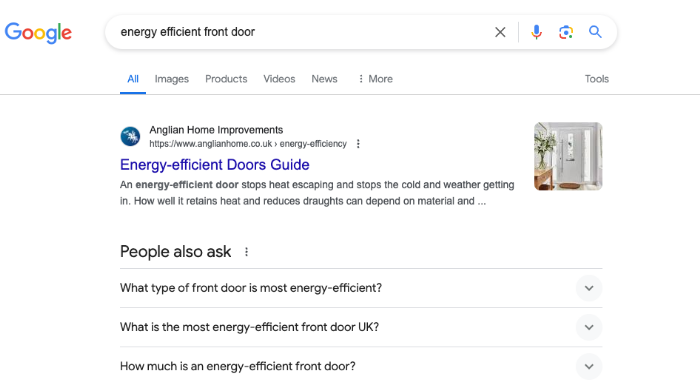
To have an effective Search Engine Optimisation (SEO) strategy requires detailed keyword research to ensure your website is ranking for the right keywords.
By using your resources towards the right keywords will help to drive more organic traffic to your website on Google and in search engine results. Not just traffic either, the right high quality traffic with the desired search intent to drive more enquiries and conversions on your website.
Our blog post will look at why it is worth conducting keyword research, along with tips and advice such as search volume, type of keywords, keyword difficulty and search intent to look at for finding and planning the right content strategy for your website.
Why Conduct Keyword Research?
When planning your search engine optimization strategy it is essential to ensure you know the best keywords for your audience to be targeting. This will ensure that your time and resources are invested in the right keywords to benefit your marketing efforts.
Keyword research important to regularly review and analysis to help benefit your search engine rankings. Within your keyword research it will highlight what your audience is looking for, as opposed to your efforts going towards what the business wants to target.
It is important to have a deeper understanding of what problems and search intent your target audience have. When take time to research keywords it allows you to plan according for creating content that is for relevant search terms to help your rankings on Google and search engines.
Business Knowledge
A productive starting point is to use the knowledge you have already of any existing website data on your website to identify any particular keyword which has been so far taking traffic to your website.
This will provide an initial starting point to identify what is and isn’t already performing well to build upon.
Then from your own knowledge of your business and customers it is recommended to create a keyword list, which could be single words or terms that could be grouped into clusters of themes to target when create content on your website.
If you are unsure on what specific keywords potentially are likely to be used within a Google search which would be relevant for the products and services you provide, it could be worthwhile speaking to your customer service or sales team to understand what questions they receive on the phone or email from enquiries or existing customer base.

Competitor Research
Once you have a set of new keywords looking to target, it is important to look at your main competitors to see if they also are targeting the same or similar keywords.
This will help to identify if the target keywords likely have high competition and therefore likely to have a high keyword difficulty (KD). However it could be popular due to driving a high search volume, so still worthwhile targeting with your SEO.
Alternatively it can help to recognise any niches or gaps in the keyword rankings that could also be worth targeting, Although they may have lower monthly search volumes, they can give a better chance at reaching the top rankings for the keyword.
We discuss search volumes in more detail below and their relevance in your SEO strategy.
Search Volume
When completing keyword research there will naturally be high volume keywords which are regularly searched each month in the search queries. However, there will also be keywords with a lower monthly search volume, which typically are long tail keywords. These are typically three or more words usually.
When deciding the organic keywords to target, it is recommended to from the search volume data to include a mixture of the above.
Whilst there can be what feels impactful and quick results from aiming for the high volume keywords and related keywords to gain more traffic to your website from the search results. Often the long tail keywords the search intent can be further along in their purchase journey and now know exactly what they need.
So whilst the volume is lower, they can be more likely to convert into an enquiry or purchase, as not at the beginning of the sales funnel.
There are various SEO tools which can help to identify and anaylse keyword data including search volumes and their keyword difficulty (KD). This will help to identify the areas of focus to prioritise keywords targeting.
Search Intent
When completing keyword research there will naturally be high volume keywords which are regularly searched each month in the search queries. However, there will also be keywords with a lower monthly search volume, which typically are long tail keywords. These are typically three or more words usually.
When deciding the organic keywords to target, it is recommended to from the search volume data to include a mixture of the above.
Whilst there can be what feels impactful and quick results from aiming for the high volume keywords and related keywords to gain more traffic to your website from the search results. Often the long tail keywords the search intent can be further along in their purchase journey and now know exactly what they need.
So whilst the volume is lower, they can be more likely to convert into an enquiry or purchase, as not at the beginning of the sales funnel.
There are various SEO tools which can help to identify and anaylse keyword data including search volumes and their keyword difficulty (KD). This will help to identify the areas of focus to prioritise keywords targeting.

Content Planning
Once keyword ideas and related searches have been compiled together from the keyword research, it is important to then ensure you are delivering the right answers and solutions for the user.
Simply filling a page with keywords isn’t sufficient to rank higher in the search engine results pages.
Google want to ensure users of their search engine are getting the information they require. So your position in the rankings will be impacted by the authority achieved and how relevant your content is for that search query.
The content must be relevant for the user intent and needs to be be strong enough content to be ahead of your competitors, to achieve a high ranking the content. Particularly if the keyword difficulty is high.
It must be helpful and informative for the user to provide the answer required. This could include relevant examples, up to date information and ideally a unique point of view to the solution or advice.
Testing And Optimisation
As part of any SEO strategy it is essential to regularly test, analyse and optimise search engine optimisation to review how the keywords are performing, having up to date keyword research and making any necessary changes and improvements to continuously improve your keyword targeting.
Keyword research is only one element of SEO to invest time and effort into, there are many other elements that must be understood and implemented to ensure your website is reaching the highest rankings for the relevant search terms and target keyword to drive traffic to your website. This in turn will also require regular testing and optimisation.
How Can We Help?
We hope our blog post was useful to provide helpful tips and advice for your keyword research. As well as detailing why is keyword research important to take the time and effort to conduct thoroughly and on a regular basis too.
We are SEO experts and specialists who can happily help to improve your SEO efforts and SEO strategy moving forward. Please free to contact us to discuss how we can help improve your rankings on search engines and drive more traffic to your website.
Ben Webster
Creative director at 1PCS. Addicted to design, SEO, pizza and helping companies big and small succeed online.

